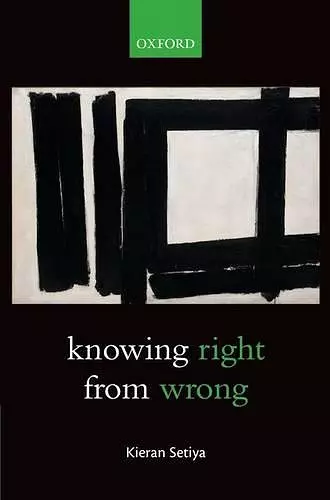Knowing Right From Wrong
Explores objective ethical knowledge and its connection to human nature.
Format:Hardback
Publisher:Oxford University Press
Published:29th Nov '12
Currently unavailable, and unfortunately no date known when it will be back
This hardback is available in another edition too:
- Paperback£34.49(9780198709619)

This book explores whether objective knowledge of ethics is possible, addressing skepticism surrounding moral beliefs. It argues that human nature is the foundation of ethical understanding and knowledge.
In Knowing Right From Wrong, Kieran Setiya tackles profound questions regarding the nature of ethical knowledge and the possibility of understanding right and wrong. He explores whether it is feasible to achieve objective knowledge about how we should live and what actions are justifiable. Setiya raises critical concerns about the reliability of our beliefs, particularly in light of widespread ethical disagreement. He challenges the notion that our beliefs could be true merely by chance, questioning the foundations of our moral understanding.
Setiya engages with several key arguments that highlight the complexities of ethical epistemology. He addresses the challenge presented by ethical disagreement, arguing that skepticism arises when we encounter conflicting moral views. To counter this skepticism, he suggests that we need to move beyond traditional epistemological frameworks, such as intuition and coherence, which may not adequately support our claims to ethical knowledge. Instead, he advocates for a more robust approach that prioritizes truth in our ethical standards.
Furthermore, Setiya contends that to comprehend ethical knowledge as something more than mere coincidence, we must reconsider the relationship between ethical facts and beliefs. He posits that these facts are intertwined with human nature, shaped by our shared experiences and history. By grounding ethical knowledge in our natural history, Setiya seeks to provide a more compelling account of how we can attain objective moral understanding, ultimately arguing that human nature is the foundation of ethical knowledge.
I am happy to commend an excellent contribution to a perennially contested area. All philosophers can profit from this book, and should admire the meticulous craftsmanship and the modesty and intelligence of its explorations. * Simon Blackburn, Times Literary Supplement *
careful, lucid, and attractive . . . I am happy to commend an excellent contribution to a perennially contested area. All philosophers can profit from this book, and should admire the meticulous craftsmanship and the modesty and intelligence of its explorations. * Simon Blackburn, Times Literary Supplement *
Kieran Setiya's book . . . aims to silence three skeptical challenges that build from concerns about moral disagreement, the reliability of our moral belief forming mechanisms, and the possibility that we might come to have true moral beliefs completely by accident. Setiya's response to these challenges is sophisticated and nuanced: he identifies what the structure of justification and the nature of ethics must be like if these skeptical concerns are to be refuted, and he builds a case that justification and ethics are actually like this. The result is a rich and interesting defense of moral knowledge and justification . . . a rich and provocative contribution to moral epistemology and to ethical theory more generally * Charlie Kurth, Notre Dame Philosophical Reviews *
Setiya has written a book that is imaginative and novel, both in the way he develops the skeptical worries at its core, and in the way he addresses them. * Paul Schofield, Journal of Moral Philosophy *
ISBN: 9780199657452
Dimensions: 211mm x 143mm x 17mm
Weight: 330g
192 pages